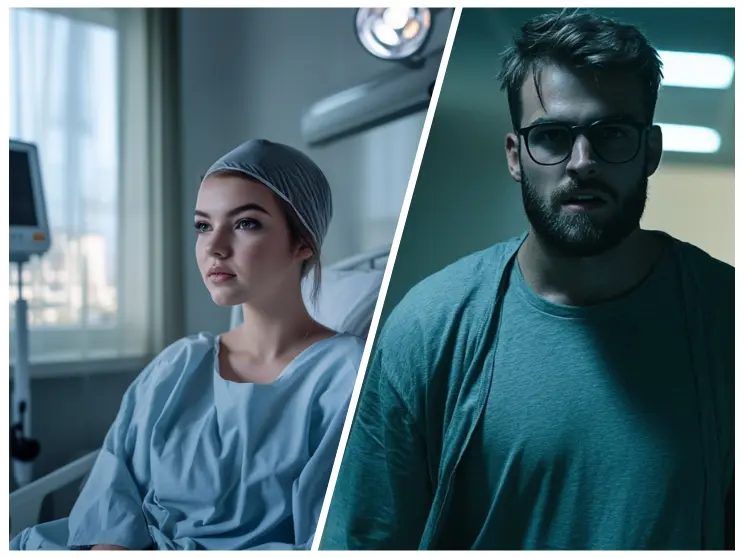The room smelled like antiseptic and metal. Machines blinked in slow rhythm beside her bed, the only proof she was still alive. Clara lay staring at the ceiling, too weak to move, too tired to hope. Every breath felt borrowed, every heartbeat a quiet reminder that she was still here — and he wasn’t.
He had promised he’d stay. Promised he’d be there through everything — the sickness, the fear, the long nights when she couldn’t sleep. But promises don’t mean much when the person who made them walks away. The last time she saw Evan, he was standing at the door, saying something about needing space. She remembered nodding, too drained to argue.
Now, there was only silence. No calls. No visits. Just the echo of a life she once shared with someone who couldn’t bear to watch her fade. The world outside moved on, but inside that room, time stopped. And as the days passed, one thought kept her awake — he hadn’t just left her.
The morning light poured through the kitchen window, spilling across the counter where Clara whisked pancake batter. The radio hummed low, a cheerful old tune she sang along to. The smell of coffee drifted through the room, blending with the sweetness of syrup on the stove.

Evan wandered in, still half-asleep, his tie hanging loose. “You’re up early,” he murmured, leaning in to kiss her cheek. Clara smiled. “You say that every morning.” He grinned. “And you always make it sound like a good thing.” Five years married — five years of small routines and quiet joy.
Mornings like this were their rhythm: her humming, his phone buzzing on the counter, the easy comfort of two people who’d built something steady together. After breakfast, she packed her sketchbooks for class. Her students — a lively group of paint-smeared dreamers — were her favorite part of the week. Lately, though, she’d been tired more often.
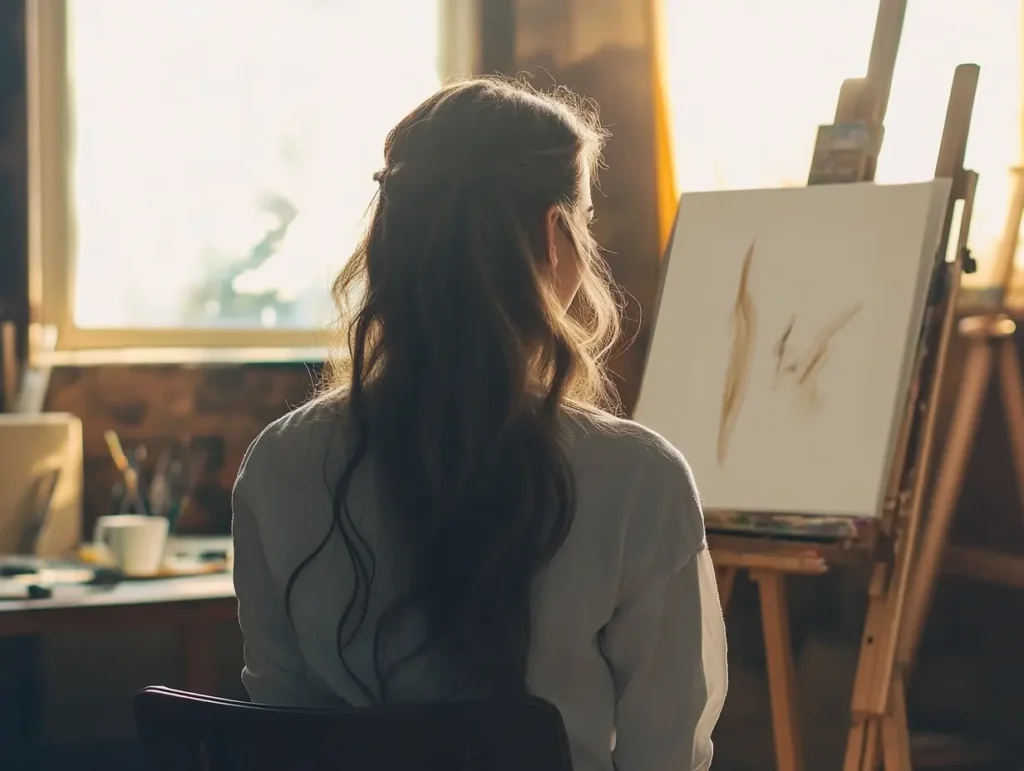
Maybe stress. Maybe the long hours. She didn’t think much of it. By afternoon, the park below their apartment glowed gold in the autumn light. Clara walked home through it, sketching colors in her mind. Everything was ordinary. Exactly as it should be. She didn’t know that sometimes, the worst things begin quietly.
A nosebleed that wouldn’t stop. Bruises she couldn’t explain. Fatigue that sank deeper each day. Evan noticed her slowing down, her paler skin — but brushed it off too, until the night she collapsed on the kitchen floor.

When she woke, the world smelled like antiseptic. The light overhead was harsh and cold. Evan sat beside her hospital bed, his fingers tangled with hers, his face drawn tight. “You scared me,” he whispered, trying to smile but failing.
The doctor’s words came like static. Leukemia. Aggressive. Immediate treatment. She caught fragments — chemotherapy, bone marrow, prognosis — words that tumbled together into something too big to process.

For a moment she thought she saw pity in Evan’s eyes, but it vanished so quickly she wondered if she’d imagined it. He squeezed her hand. “We’ll fight this,” he said. “You’ll get better. I promise.” She believed him.
The first few weeks were a blur of white rooms, soft-spoken nurses, and the hum of machines. Evan was there for all of it — sleeping on the recliner, fetching her water, kissing her forehead between appointments. He joked when she couldn’t, filled the silence when she was too tired to speak. She told her mother she didn’t know what she’d do without him.
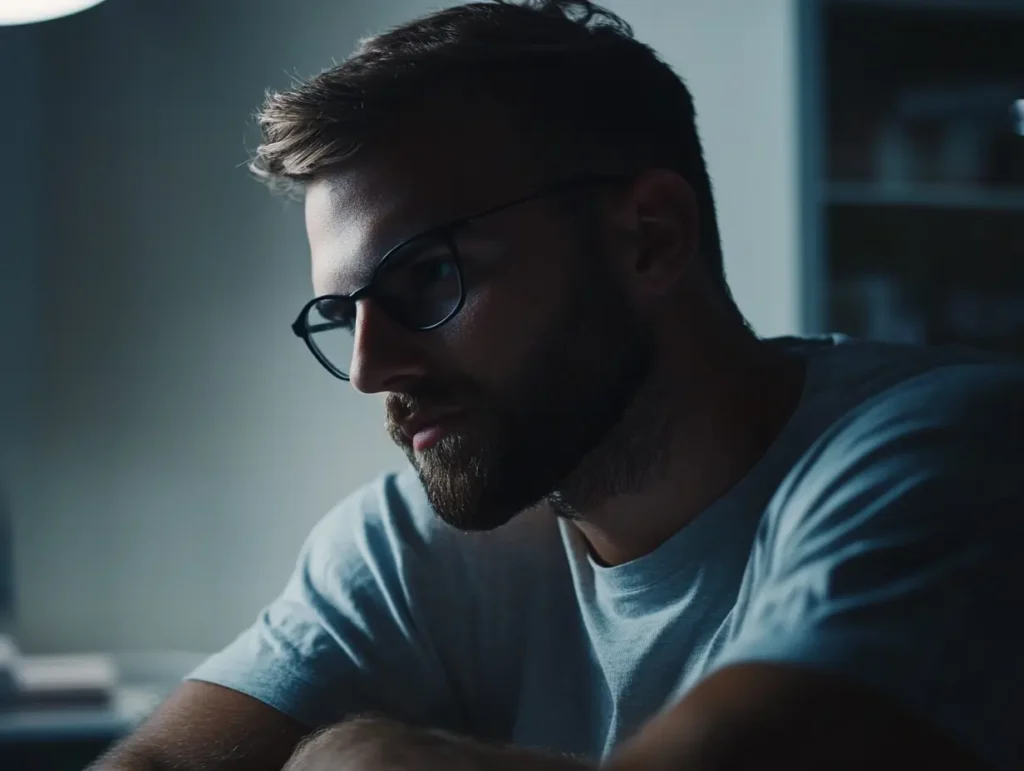
But cancer has a way of hollowing out more than bodies. It drains accounts, routines, and certainties too. Even with insurance, every bill that came through the door felt heavier than the last. Evan started picking up extra shifts, staying late, taking freelance work he hadn’t done in years.
He said it was “just to keep us ahead of it,” but Clara could hear the strain in his voice. “The treatments are working,” he’d say, trying to sound upbeat. “We just need to push through a little longer.” She’d smile and nod, pretending not to notice how often he checked their bank app afterward, or how the furrow between his brows never seemed to fade.

The nausea came first, then the pain, then the hair. Her reflection grew stranger by the day. Her skin dulled, her smile weakened, and her laughter — once the soundtrack of their home — began to fade. Still, she tried to stay hopeful.
She painted small things — oranges, hands, the park outside her window — fragments of the life she wanted to return to. Evan would hang them near her bed, though lately, his eyes lingered more on his phone than her work.
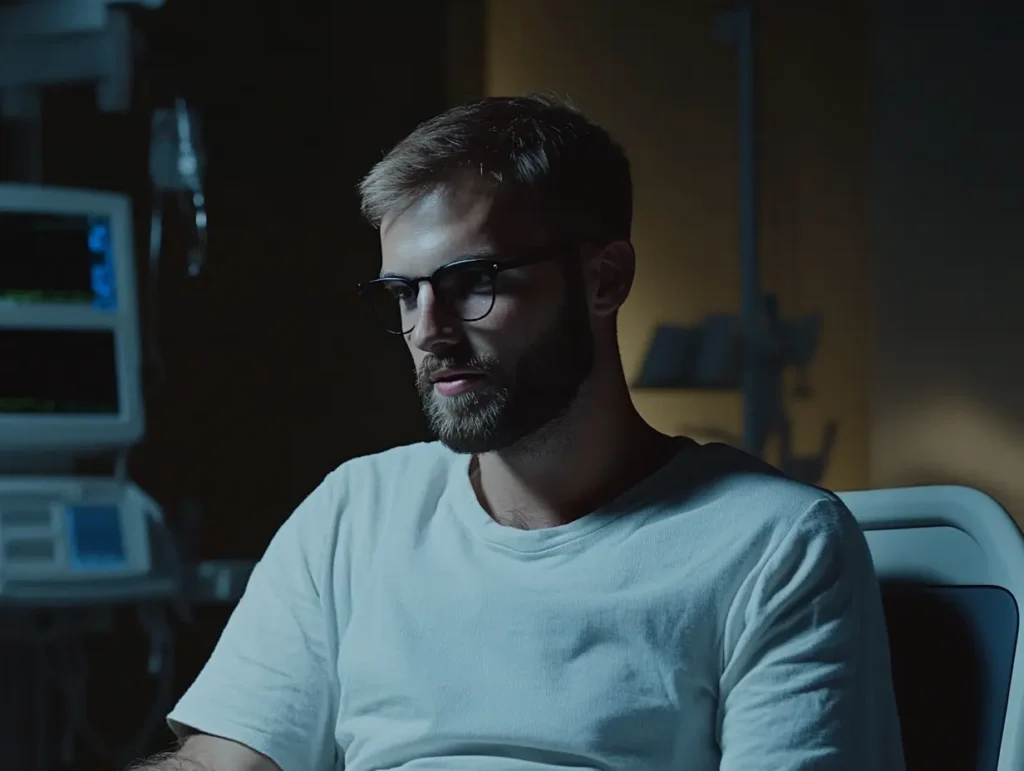
The hospital became her second home — its soft beeps, antiseptic smell, and endless white corridors as familiar as her own apartment. Evan was still there, her constant through the blur. But even constants begin to crack under pressure.
He brought her books she never finished, flowers she couldn’t smell, and stories from the outside world that made her smile. Some nights, when she was too nauseous to sleep, he’d read softly until her breathing evened out.
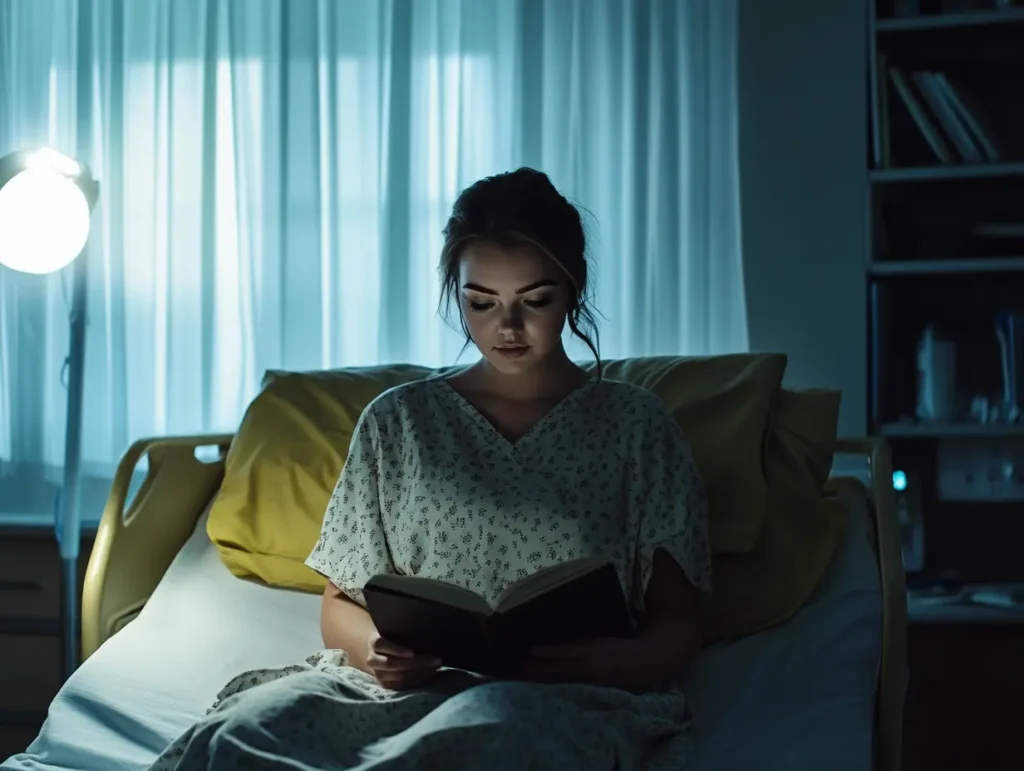
When she apologized for how tired he looked, he’d squeeze her hand and say, “Don’t be silly. I’m exactly where I should be.” But money crept into their conversations like a third presence — quiet at first, then impossible to ignore. “The landlord called again,” he said one morning, his tone too calm. “Just a mix-up, I’ll handle it.”
“How bad is it?” she asked. “Not bad,” he said, and smiled, but she saw his fingers tighten around the coffee cup. Her hair began to fall out slowly, strands caught between her fingers or left on the pillow in the mornings.
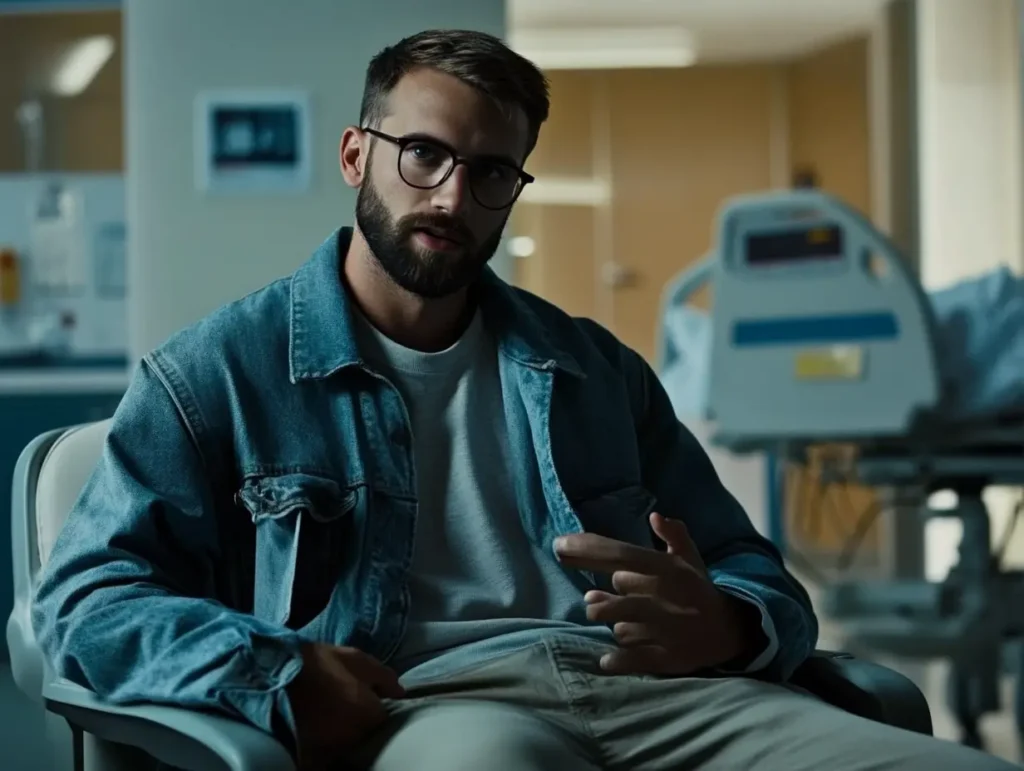
She’d brush it away before he came in, but he noticed anyway. One evening, she caught her reflection in the window — pale, fragile, her scalp showing through uneven tufts. The sight made her throat tighten. Evan appeared behind her then, setting down a cup of tea, and saw what she saw.
“You’re beautiful,” he said quietly. No hesitation, no forced cheer. Just steady conviction. It almost undid her. Still, there were moments when exhaustion bled through — in him, not her. He’d fall asleep sitting upright, phone buzzing with messages he ignored. He missed meals.
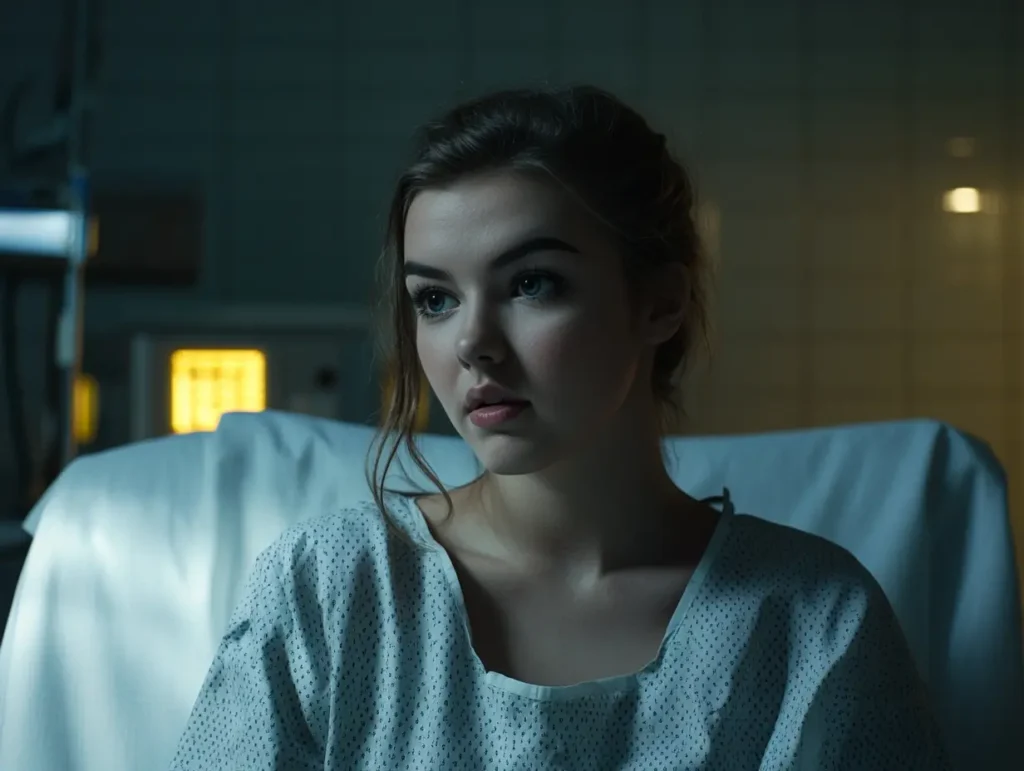
He answered calls in the hallway that stretched on for hours. Sometimes, when she’d wake from the fog of medication, she’d find him staring at her like he didn’t know how to help anymore. It wasn’t cruelty, she told herself — just helplessness.
She hated that he had to see her like this, that the laughter they used to share had been replaced by sterile routines and small talk. She wanted to make it easier for him, to pretend she was stronger than she felt.
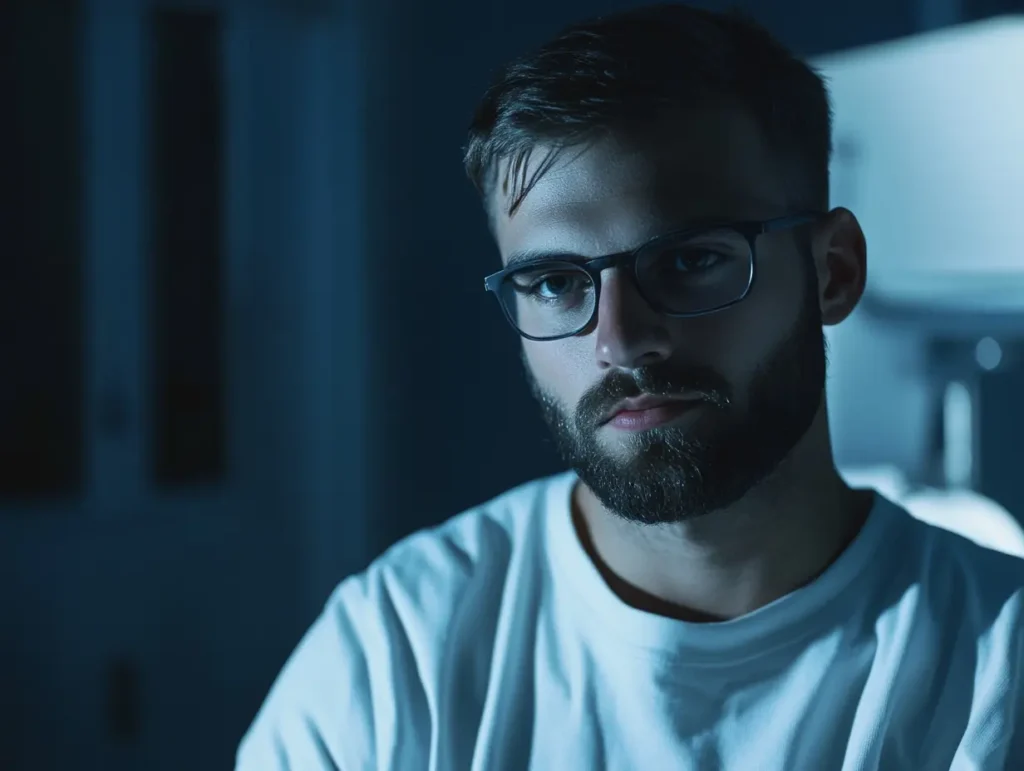
But the cracks were forming, fine lines beneath the surface that neither of them wanted to name. One afternoon, he came in dressed for a meeting. His hair was neatly combed, his tie straight. He looked like the version of him she remembered from before the hospital, and for a fleeting second she felt jealous of whoever would get to sit across from that man today.
“You look nice,” she said, forcing a smile. He smiled back, though his eyes were tired. “I’ll only be gone a few hours. I picked up another client.” “Don’t rush,” she said softly. “I’ll be here.” And she was.
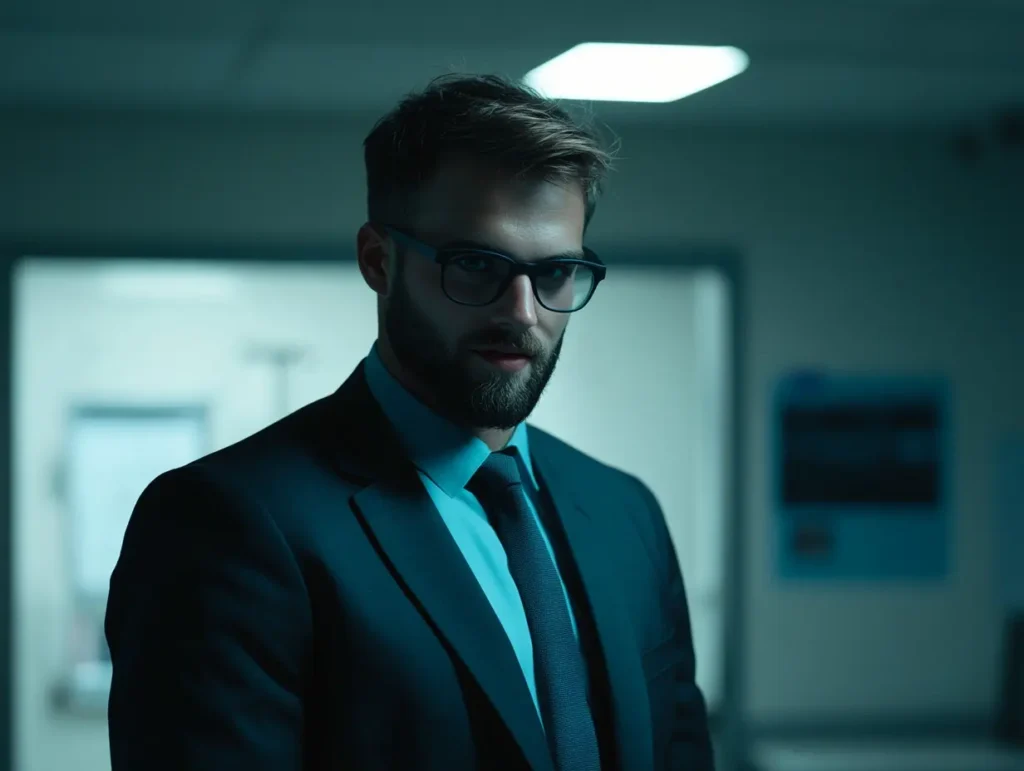
Later that night, when he returned, she was too weak to sit up. He helped her sip water, held the glass steady when her hand trembled. He didn’t complain when she needed him to adjust her pillows again, or when the nurse asked him to step aside for another round of medication. He just looked at her — not pitying, not impatient, just… hollow.
Clara watched him from the edge of her sleep, his silhouette against the blue hospital light. She knew he loved her. But love was starting to look different now — quieter, thinner, stretched between what he felt and what he could bear.
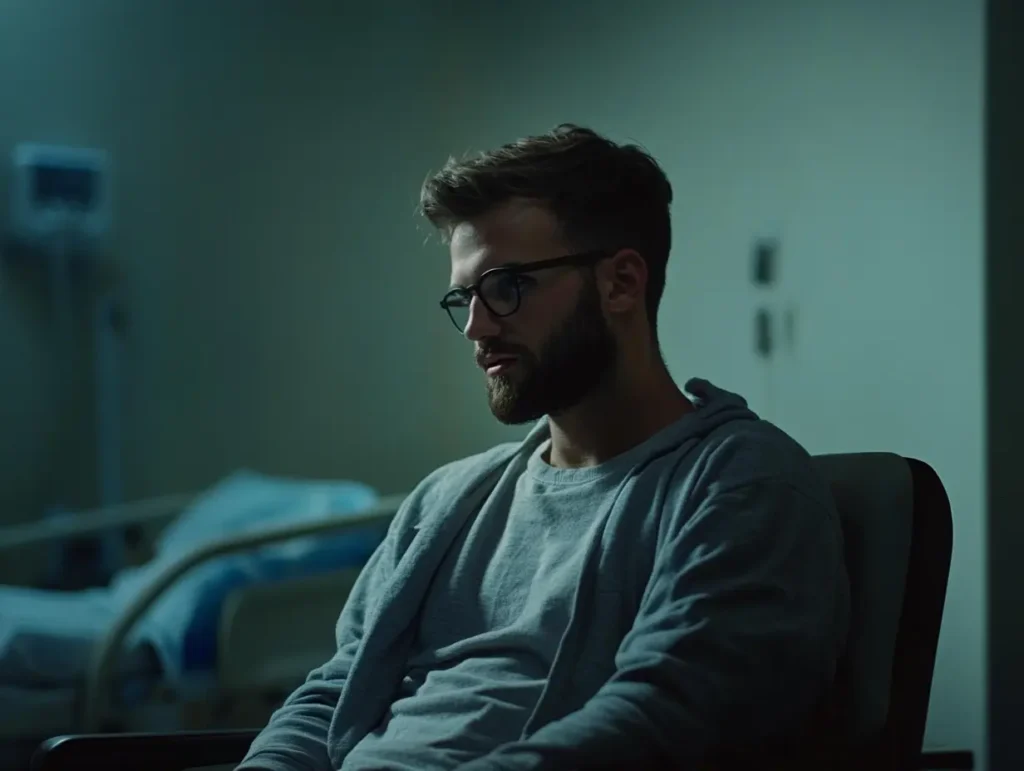
In the days that followed, he began to fade in small ways. A shorter visit. A call he didn’t answer right away. A message he forgot to return. None of it meant anything on its own, but together they formed a pattern she couldn’t ignore.
He started saying things like “I’ll try to stop by tomorrow” instead of “I’ll be there.” When she said she missed him, he smiled but didn’t reply. Sometimes, when she called in the evenings, she’d hear the faint hum of conversation behind him — laughter, a clink of glass — before he quickly said, “I can’t talk right now, I’ll call you later.”

When she told him about the dreams she’d been having — the ones where she was healthy again, walking through the park with him — he’d nod and say, “That sounds nice,” as if listening to a story about someone else’s life.
One evening, he arrived late, the scent of rain still clinging to his jacket. It wasn’t just rain, though — there was something unfamiliar beneath it, a faint trace of perfume, floral and expensive, the kind she never wore. He noticed her glance and rubbed his collar like it irritated him.
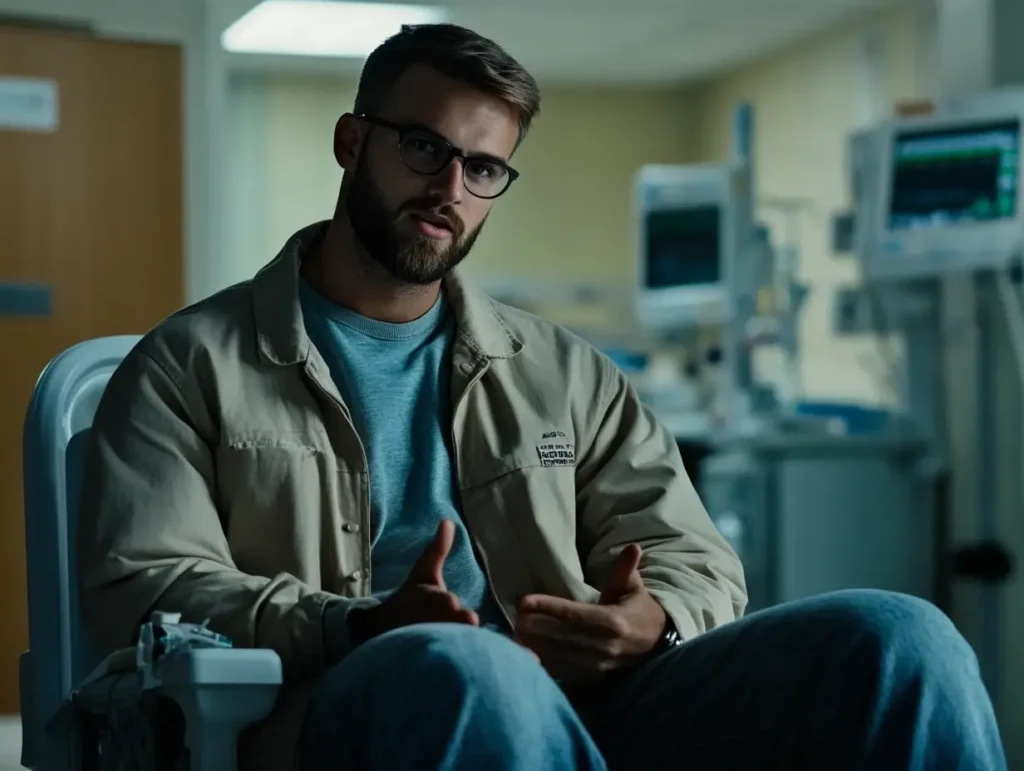
“Work running late again?” she asked, voice soft. He nodded, loosening his tie. “Back-to-back meetings. It’s been chaos lately.” “You should take a day off,” she said gently. “You’re burning yourself out.”
He gave a quiet laugh that didn’t sound like one. “And do what? Sit here and watch you sleep?” The words hit harder than he meant them to. His face softened immediately, guilt flickering across his eyes. “I didn’t mean that.” She nodded, pretending it didn’t hurt. “I know.”
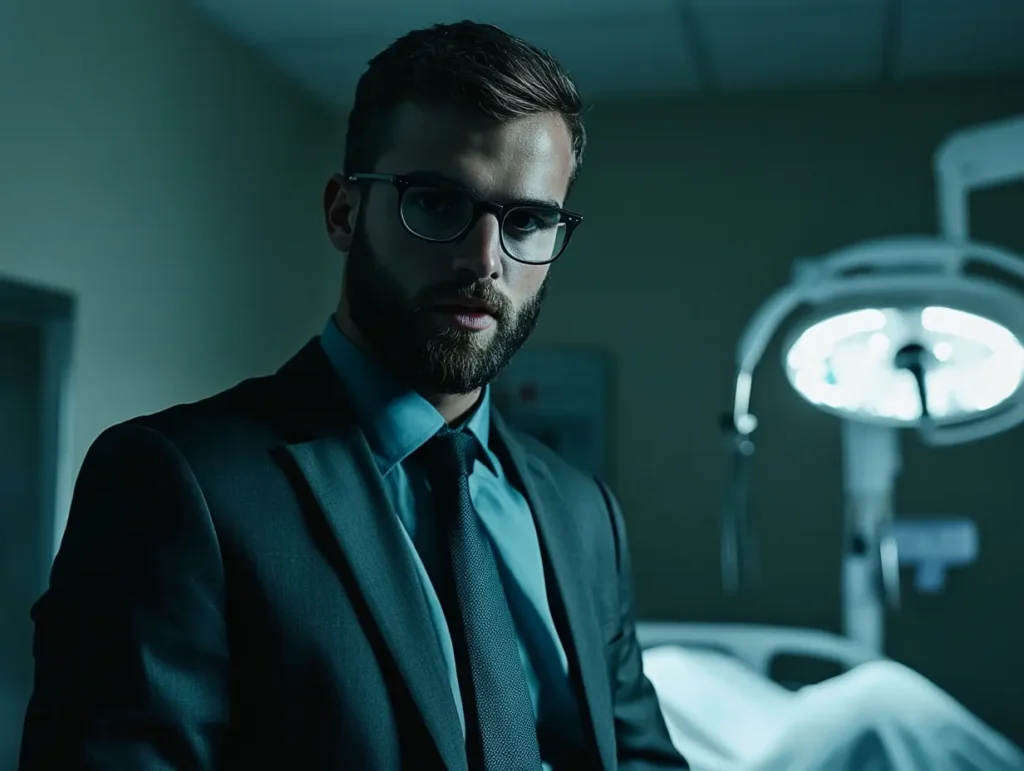
But later, as the nurse adjusted her IV and the lights dimmed, Clara replayed those words again and again. Sit here and watch you sleep. He didn’t want to be here anymore — not really. He wanted his life back. And part of her couldn’t blame him.
Evan still came by, but something had shifted. He’d stop by with a paper cup of coffee, set it on her bedside table, and scroll through his phone as she spoke. Sometimes he’d forget to look up when she asked him a question. Once, when she reached for his hand, he didn’t even notice — his thumb kept moving, typing a message she couldn’t see.
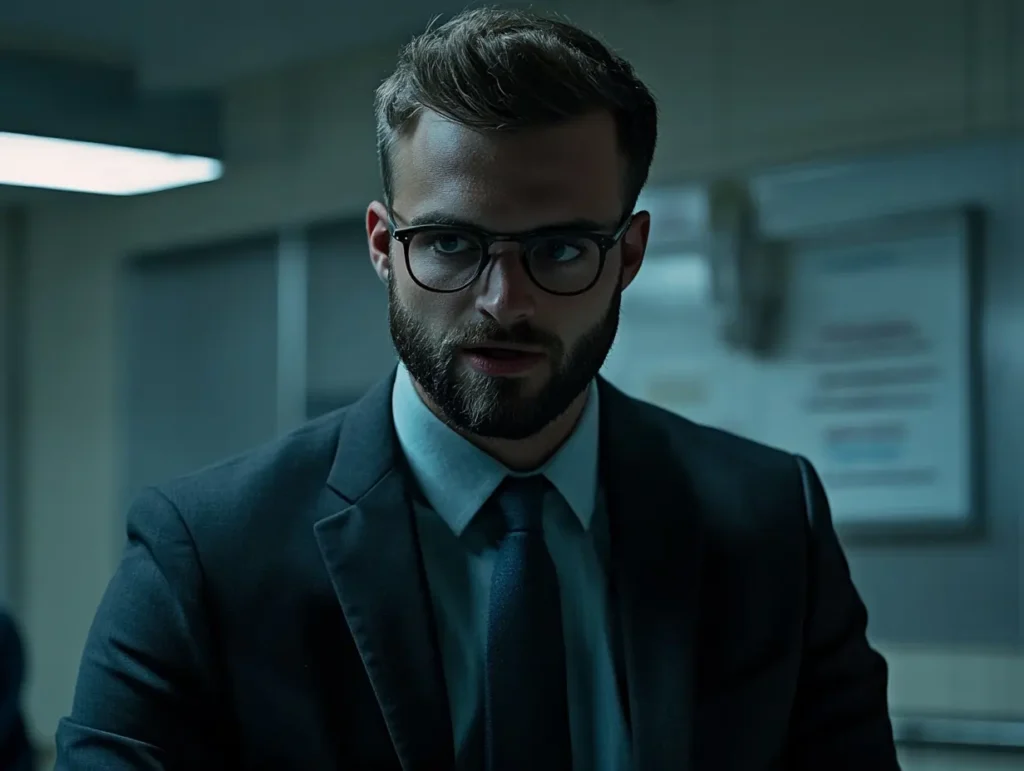
“Work again?” she asked softly. “Always,” he said, without looking up. When he finally did meet her eyes, there was a flicker of guilt — but no apology. Just exhaustion, and something else she couldn’t name. Distance. One evening, after her treatment, he came in late. His shirt was wrinkled, his tie missing, his cologne sharper than usual — a scent she didn’t recognize.
He kissed her forehead and sank into the chair with a sigh. “You okay?” she asked quietly. He nodded, rubbing his temples. “Just tired. It’s been a long week.” She hesitated. “You’ve been gone more than usual.” He laughed — short, defensive. “I can’t be everywhere at once, Clara. I’m trying.” The way he said it stung.
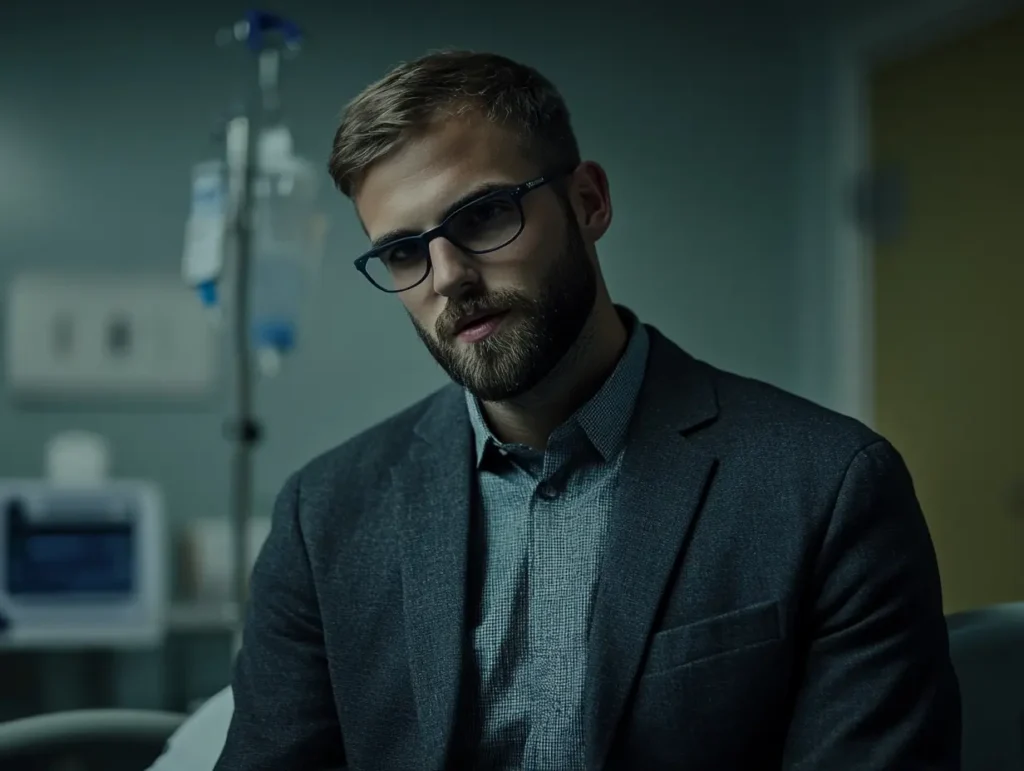
He leaned forward, elbows on his knees, staring at the floor. “You don’t understand what this is like for me. Watching you like this, day after day — it’s… it’s killing me.” Her chest tightened. “I didn’t ask you to stay,” she whispered. “I know you didn’t. That’s what makes it worse.” He exhaled, leaning back. “I just — I have needs, Clara. I can’t do this forever. I’m not built for it.”
The words fell between them like glass breaking. She looked at him, really looked — at the man she’d once loved more than anything. The man who used to dance with her in the kitchen. Now he couldn’t even look her in the eye. He stood to leave, guilt flickering across his face. “I just need time. That’s all.” When the door closed behind him, the silence roared.
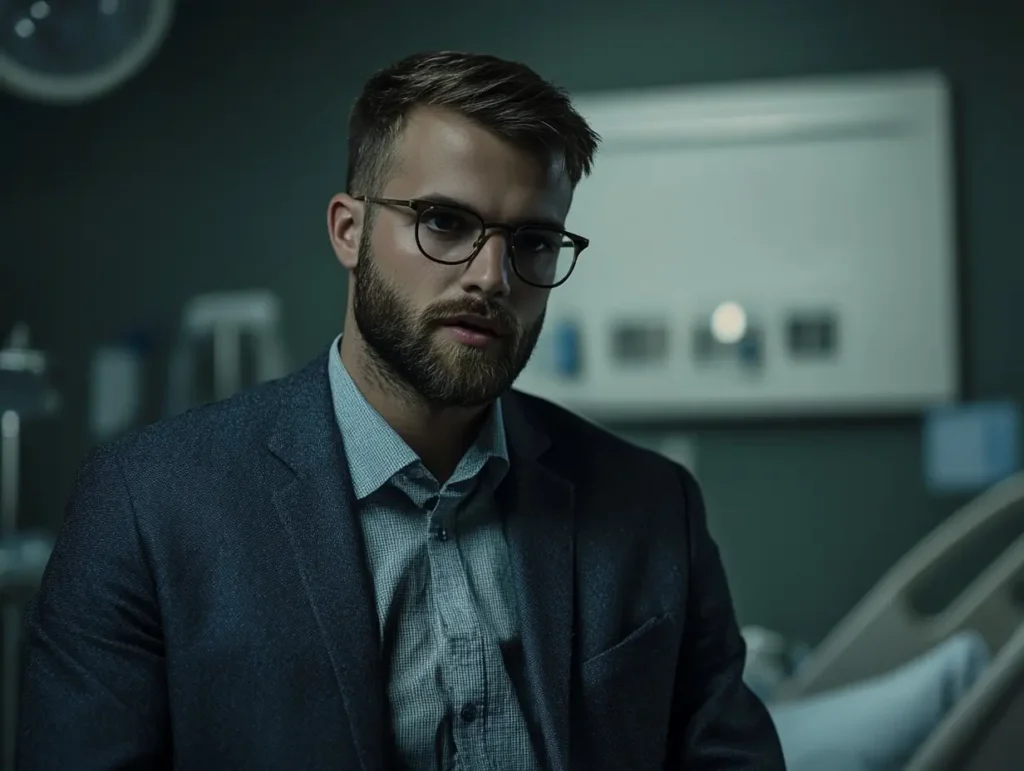
She didn’t cry that night. There were no tears left. Instead, she lay awake staring at the faint reflection in the dark window — her face pale, her eyes hollow, her body weak. The world had gone still, but inside her, something had begun to shift. By morning, her fever had returned. The nurses urged her to rest, but she couldn’t.
She tried calling Evan once, twice, three times — no answer. On the fourth, his voice came through, muffled and impatient. “Clara, I’m in a meeting. Can I call you back?” Her voice shook. “I don’t feel right. I think I need to go to the ER.” A pause. The faint hum of traffic. “I’m stuck on the highway. Please — call your mom, okay? She’ll get there faster.”

The call ended before she could respond. She sat there, phone pressed to her chest, waiting for the courage to breathe again. Then, finally, she called her mother. When Maggie arrived later that evening, she didn’t ask questions. She just took one look at Clara’s face — pale, drawn, quiet — and knew. She stayed the night holding her daughter’s hand.
“I wish I could help more,” Maggie murmured after a long silence. “I feel useless, just sitting here.” “You’re not,” Clara said weakly. “You’re here. That’s enough.” Maggie hesitated, then exhaled. “Well… maybe I’ll be able to do a bit more soon. The lawyers called this morning. Your grandfather’s estate is finally settled.
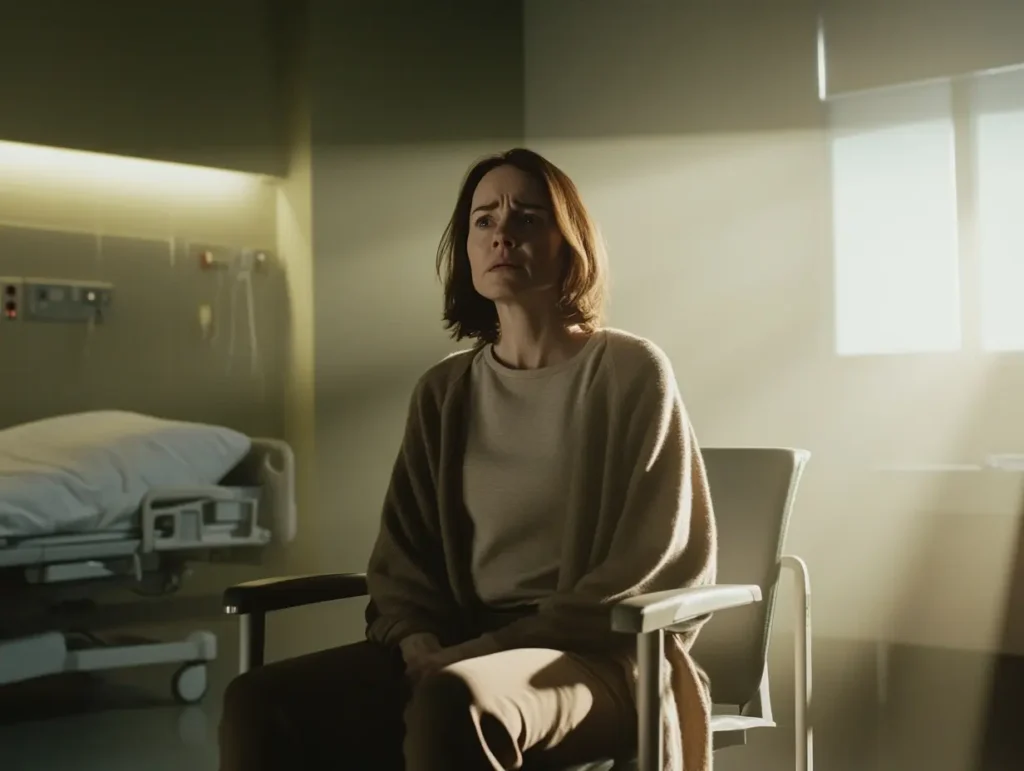
It’s not much, but the small amount should help — enough to cover the rest of your treatments, at least.” Clara looked at her mother, too tired to smile but touched all the same. “Mom, you don’t have to—” “I want to,” Maggie interrupted softly. “You focus on getting better, okay? Let me handle the rest.” For a brief moment, hope slipped back into the room.
The kind of hope Clara hadn’t felt in months. “Evan will be so relieved,” she said quietly. “He’s been worried about the bills. Maybe this will take some pressure off him.” Maggie paused, eyes narrowing slightly. “Maybe don’t tell him just yet.” Clara frowned. “Why not?” “Let’s wait until it’s in my account,” Maggie said carefully.
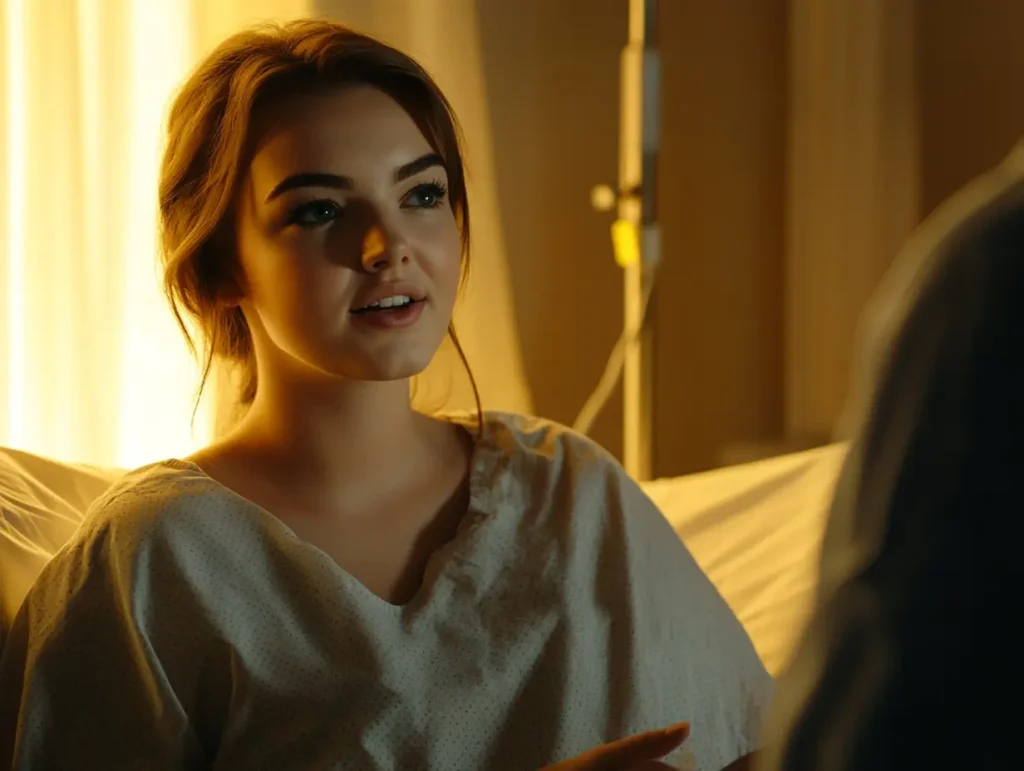
“You know how these things go — paperwork, transfers, delays. No sense raising expectations until it’s real.” Clara hesitated, then nodded. “Alright.” But as her mother tucked the blanket around her shoulders and dimmed the lights, a quiet thought lingered at the back of Clara’s mind — the feeling that her mother’s warning wasn’t about the money at all.
The days blurred again, stitched together by the same routine — the same nurse rotations, the same muted light. Maggie stayed most nights now, while Evan came and went at odd hours, his visits shorter, his excuses longer. Sometimes he’d walk in smiling too brightly, setting down a fresh bouquet as if it could erase the distance between them.
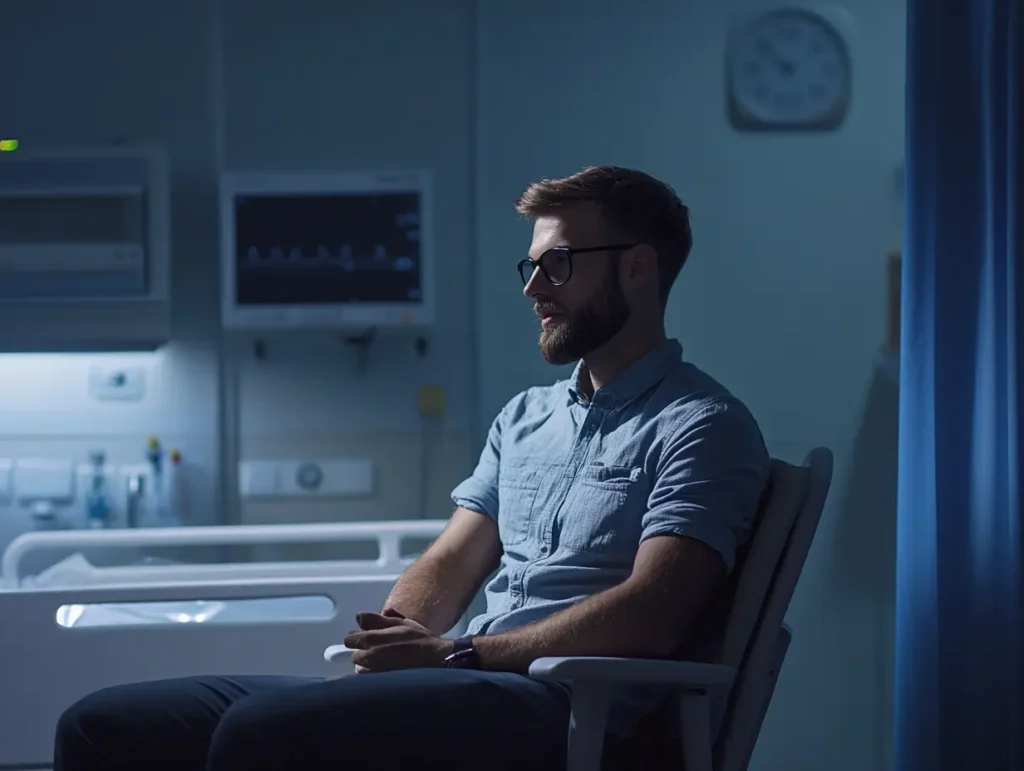
He’d talk about work, new clients, “crazy deadlines,” and Clara would nod, too tired to push further. She tried not to notice the way he always smelled faintly of perfume — not hers. One evening, after a long round of treatment, Clara drifted in and out of half-sleep while the nurses changed her IV. Their voices were hushed, but not enough.
“…breaks my heart,” one of them whispered. “She’s so sweet. And he’s always on his phone — I heard him the other day outside, whispering to someone. Definitely not business.” The other sighed softly. “I thought so too. You’d think he’d have the decency to wait, at least.” Clara’s pulse slowed. Their voices melted into static. She lay still, eyes closed, pretending she wasn’t awake.
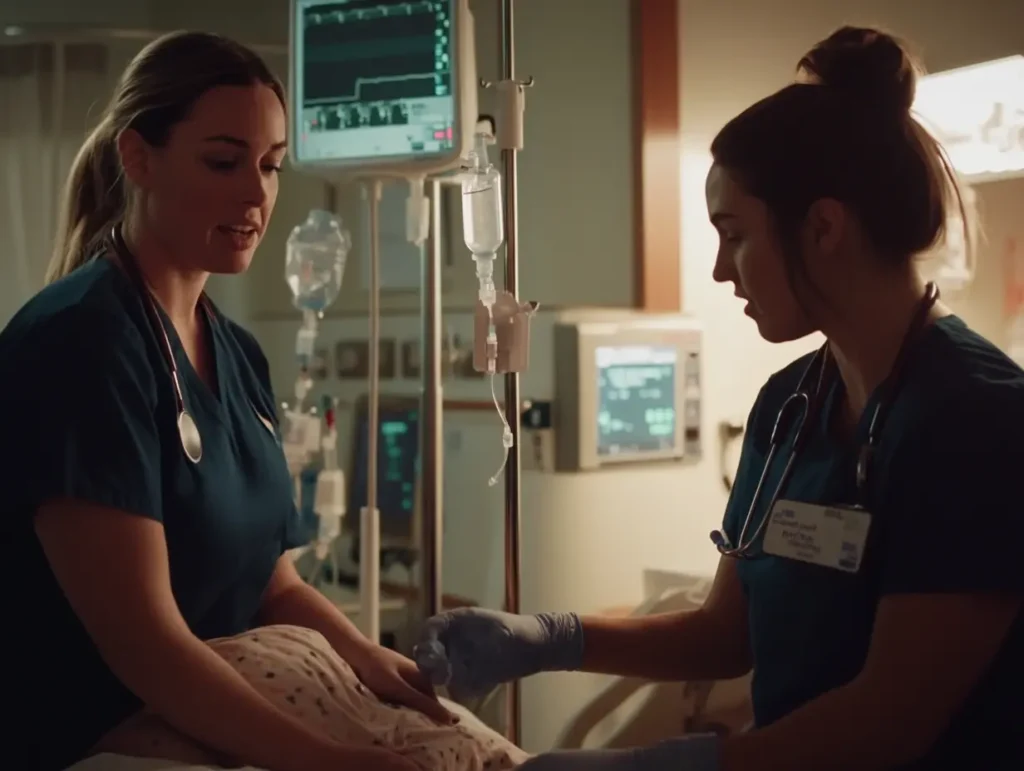
When she opened her eyes, the room was dim again. Maggie slept in the chair beside her. The flowers Evan had brought last week were starting to brown at the edges. She stared at them for a long time, her thoughts moving through a kind of numb fog.
Every word from the nurses replayed in her mind until it no longer felt like shock — just confirmation. The next morning, Evan showed up early, coffee in hand, his energy bright and forced. He kissed her cheek lightly. “You look better,” he said. “I’ve missed that smile.”
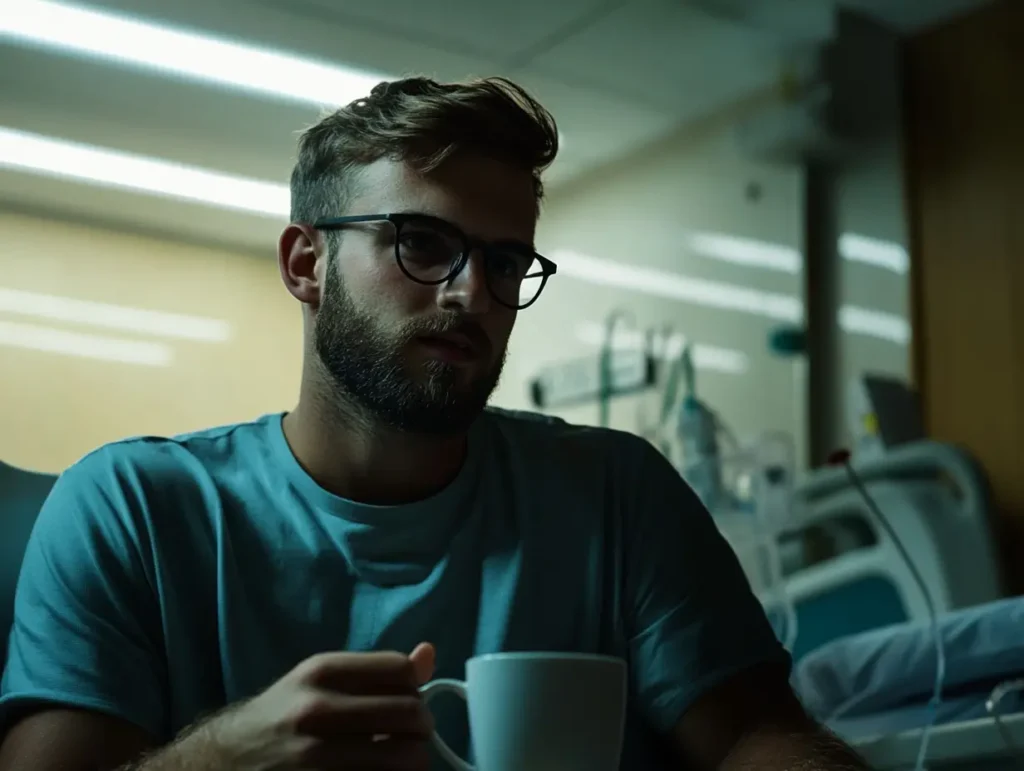
She didn’t smile. “Where were you last night?” He blinked, caught off guard. “Home. Why?” “I called.” Her voice was calm, too calm. “You didn’t answer.” “Must’ve been asleep,” he said, setting down the coffee. “Long day. What’s wrong?”
She looked at him, studying the careful mask of concern on his face. “Can I see your phone?” He froze. It was so slight that anyone else might have missed it — but she didn’t. “What?” he said, laughing softly. “Why?” “I just want to see it,” she said. Her tone was even, but the tremor in her hand betrayed her.
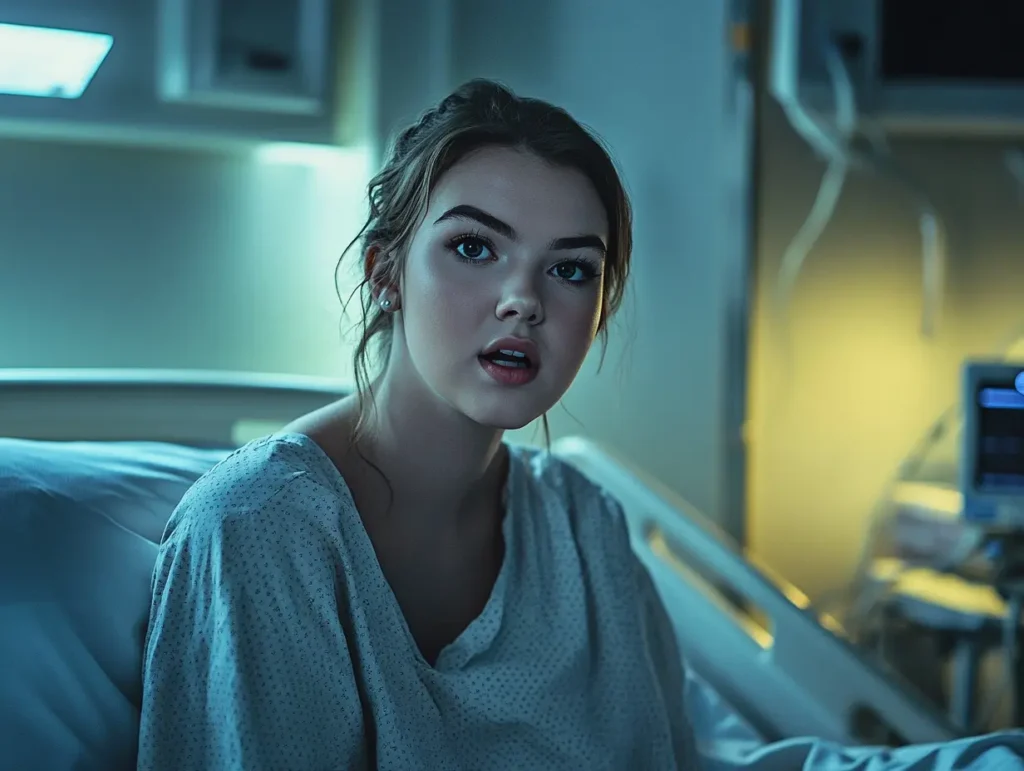
He sighed, the kind of sigh that came from someone tired of playing a part. “Clara, come on. You really think now’s the time for this?” She didn’t look away. “I think I’ve earned the truth.” The air between them thickened. He hesitated, then set the cup down a little too hard.
“I’ve been under a lot of pressure,” he said finally. “I needed someone to talk to.” “Someone?” “It’s not what you think,” he snapped, though his voice was too defensive to sound convincing. “I just… I can’t keep pretending everything’s okay. I’m exhausted, Clara. I’m drowning too.” She stared at him. “So you found someone else to save you?”

He rubbed his face, groaning. “I didn’t plan this. You don’t get it — I’ve been watching you fade for months. Every time I walk in here, I lose a little more of you. I can’t—” “Then don’t,” she interrupted quietly. “You don’t have to stay.” He opened his mouth, then closed it again. Whatever excuse he was reaching for never came.
After a moment, he turned and left — no goodbye, no look back. The room felt larger after he was gone, like even the air didn’t know what to do with itself. When Maggie returned later, she found Clara sitting upright for the first time in days, her face pale but composed.
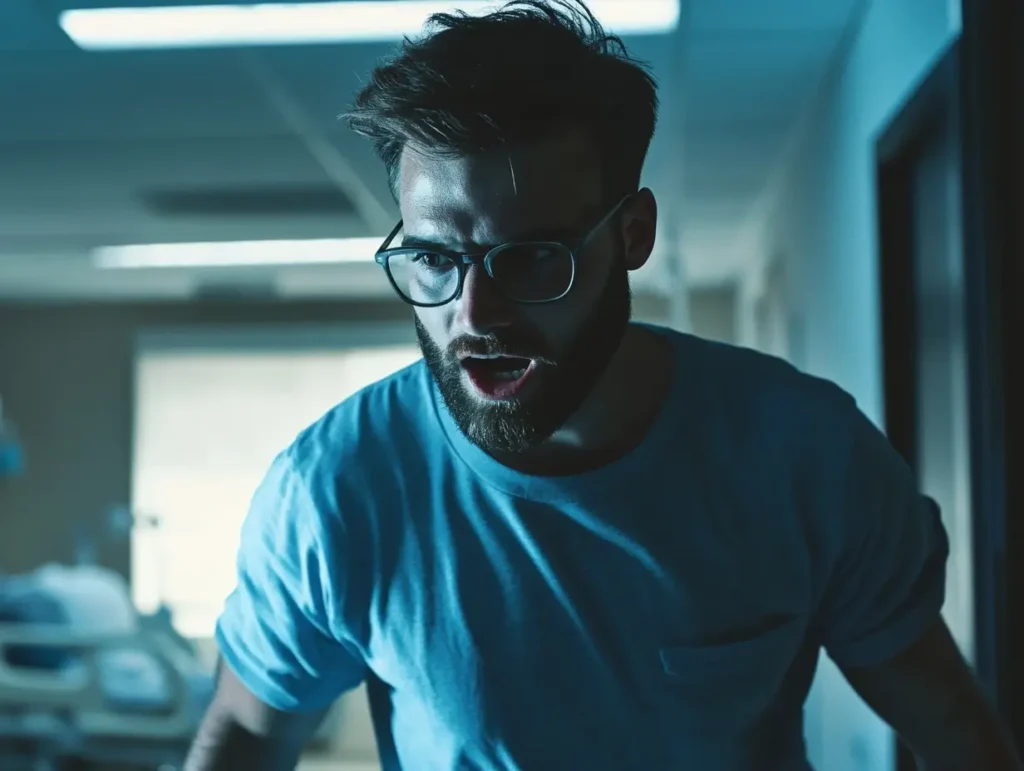
“Sweetheart,” Maggie whispered, “what happened?” Clara turned toward her mother, her voice steady but hollow. “He’s gone.” Maggie reached for her hand, eyes wet. “Then you’ve still got me.” Clara nodded slowly. “That’s all I need.”
Clara squeezed her mother’s hand, the silence between them thick with both exhaustion and understanding. For the first time since her diagnosis, she didn’t feel like she was falling — just suspended, steady enough to breathe. But then things took a turn.
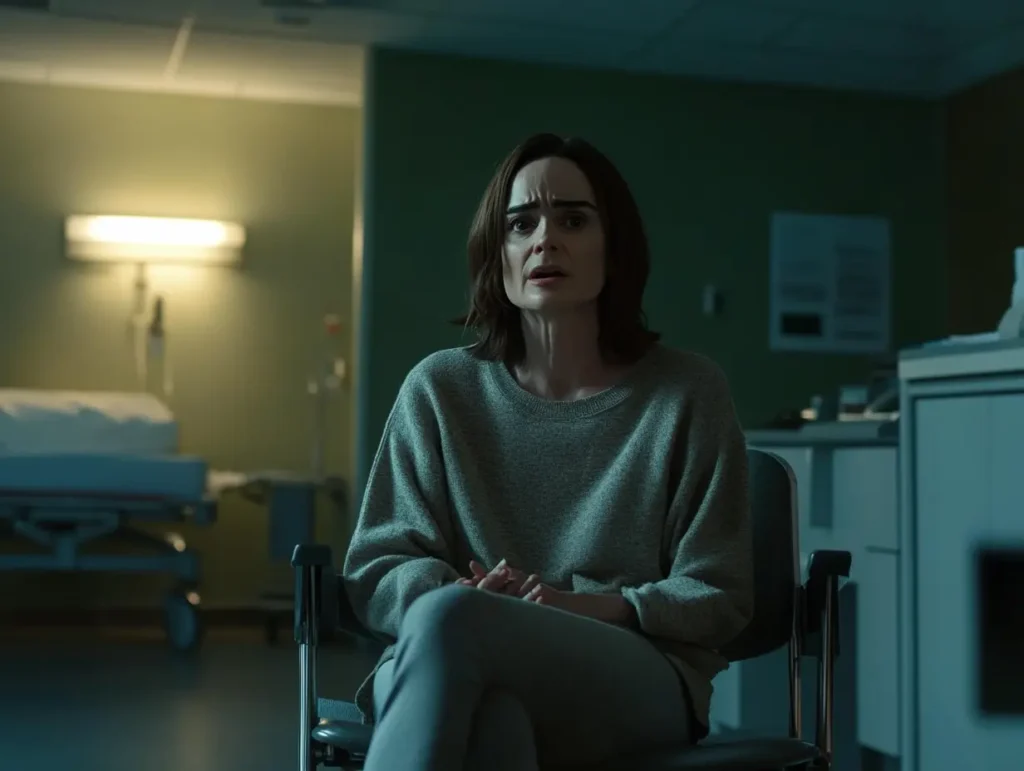
Her counts dropped lower than before. The doctors spoke in hushed tones outside her room, using words like “aggressive treatment” and “limited time.” The next phase of therapy would cost more than Maggie had — more than either of them could imagine.
Maggie spent hours on the phone with the billing office, her voice polite but fraying. Every night she told Clara not to worry, but the dark crescents under her eyes said otherwise. That evening, Clara’s fever climbed sharply. Her breaths came shallow, her fingers trembling as she reached for her mother’s arm. “Call him,” she whispered. “Just… call Evan.”
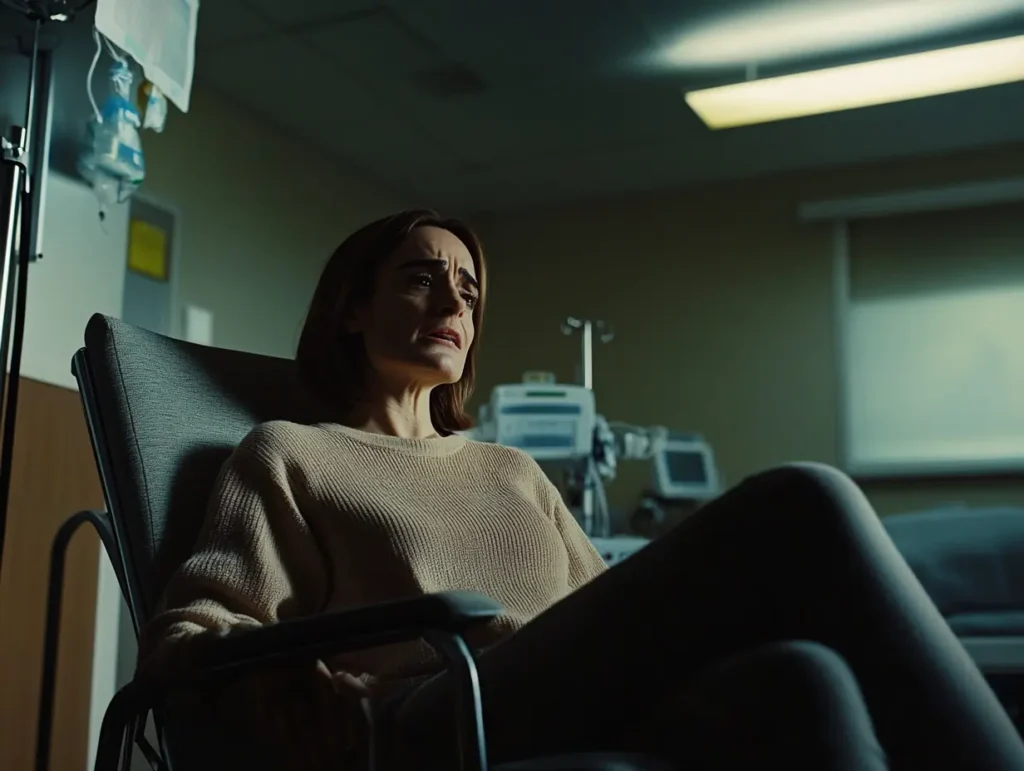
Maggie hesitated, then nodded, stepping into the hallway. Clara heard only her mother’s voice through the thin wall — low, steady, trying not to break. “Evan, it’s Maggie,” she began. “Clara’s not well. The doctors say she needs another round of treatment — soon. I’m asking if you can help, or at least be here for her.”
A pause. Then Maggie’s voice wavered. “No, I’m not asking for money. I’m asking for you to show up. She’s asking for you.” Another pause — longer this time, sharper. Her next words came out quieter. “I see. So you can’t be bothered.”
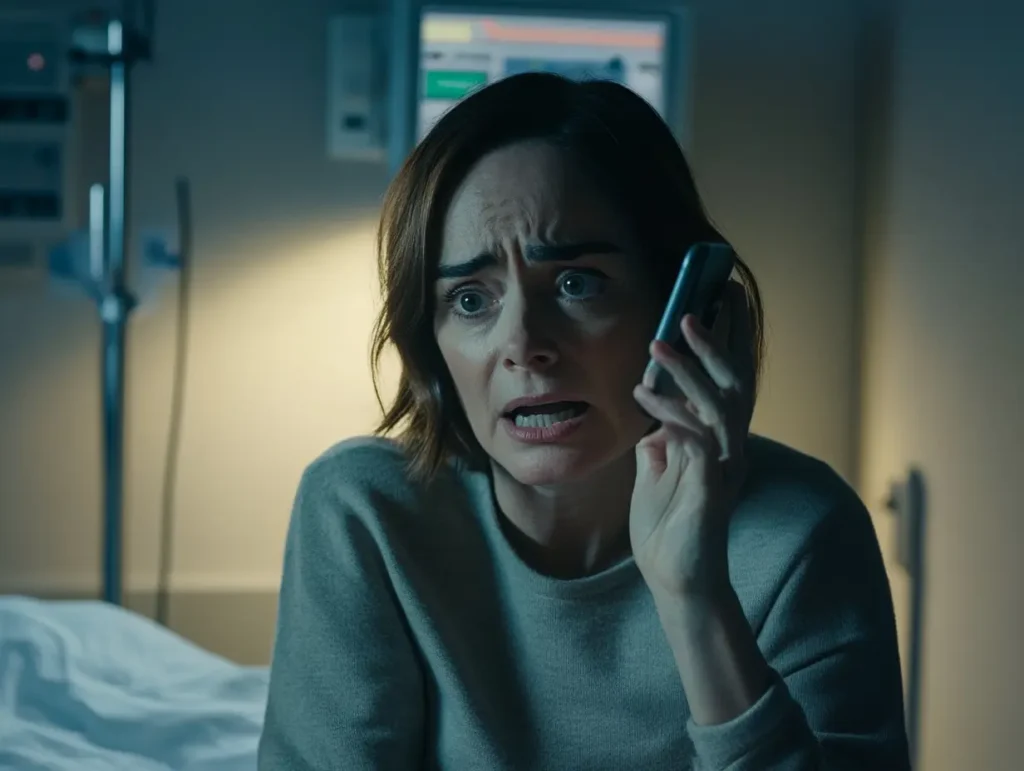
The silence stretched, broken only by the faint click of the call ending. Maggie stood there for a moment, eyes glistening, before whispering to no one, “Coward.” When she came back inside, she forced a small smile. “He sends his regards,” she said softly.
Clara didn’t ask. She just turned her face toward the window, pretending she hadn’t heard the break in her mother’s voice. After a long silence, she whispered, “Mom… what do we do?” Maggie sat down beside her, smoothing the blanket over her trembling hands. Her smile was thin, her eyes glassy. “Just leave it to me,” she said quietly. “We’ll figure it out.”
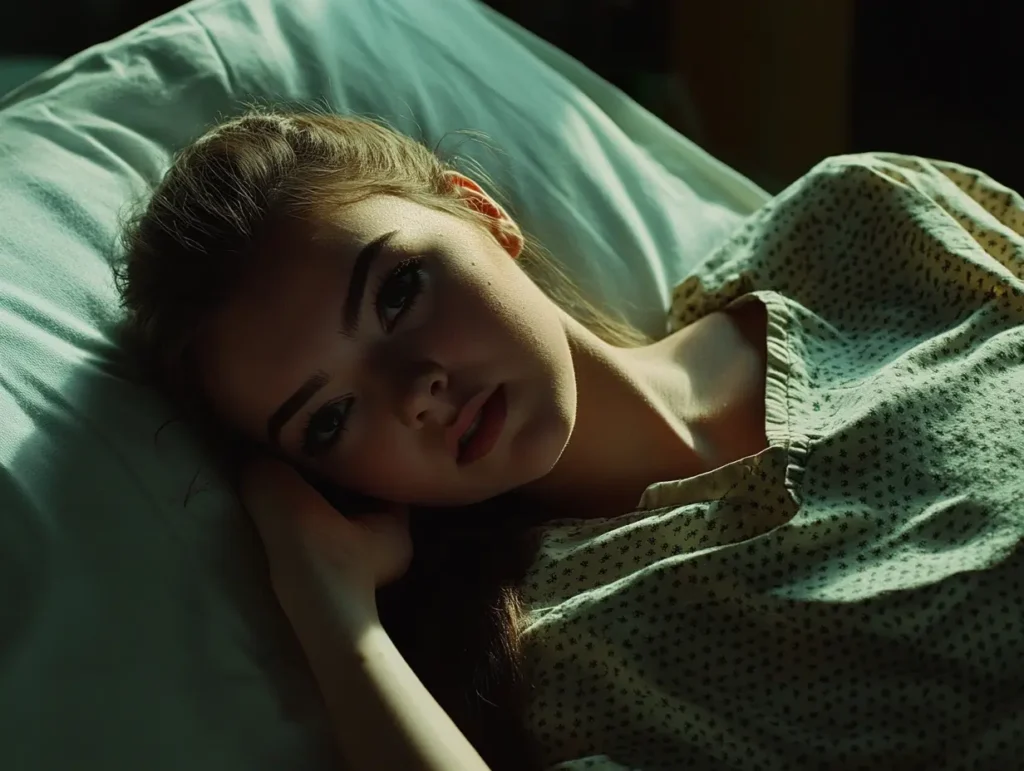
But the way her fingers clenched the fabric told another story — one of fear, desperation, and love strong enough to face both. Days passed in a blur of pain and uncertainty. Clara’s body fought back, fragile but unwilling to quit. Then, one morning, Maggie burst into the room with tears in her eyes — this time, tears of relief.
“The funds came through,” she said breathlessly. “The estate cleared. It’s more than we thought, Clara. Enough for everything.” Clara blinked through the fog of medication. “Really?” Maggie nodded, clutching the paperwork.
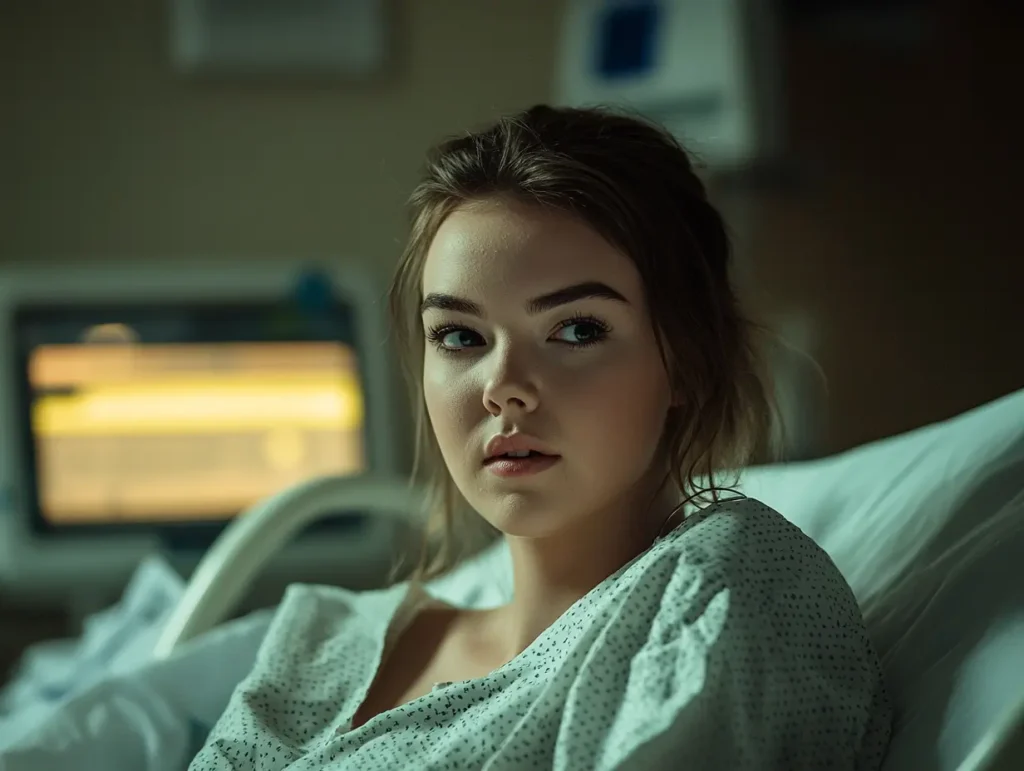
“Your grandfather had more set aside than anyone realized. The lawyer said it’s all yours now. We can pay for the treatment, the bills — all of it.” For the first time in months, Clara smiled. Not from hope, but from certainty.
The treatment began the next day — and this time, it worked. Slowly, her body responded. Her skin regained color, her appetite returned, and the sharp edge of pain dulled into memory. Weeks turned into months.
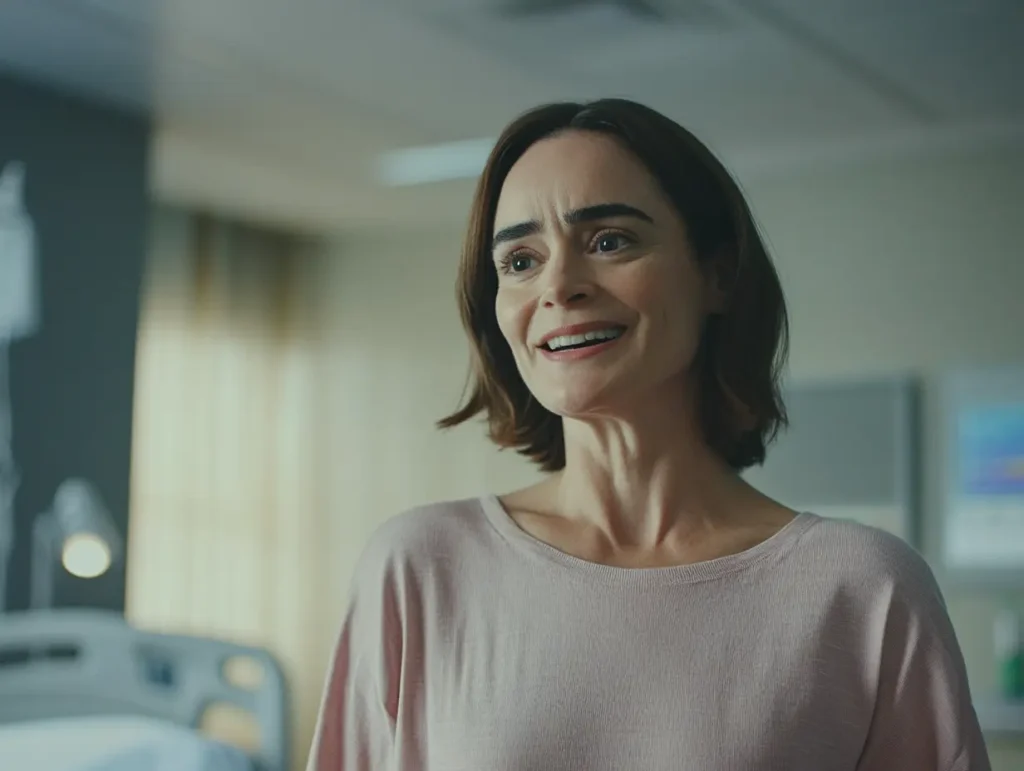
The chemo sessions grew less frequent, her hair began to return in soft brown wisps, and her body no longer trembled when she stood. Maggie stayed until she was certain her daughter could manage on her own, leaving reluctantly but with pride in her eyes.
Clara moved into a small apartment downtown — sunlight in every window, the scent of paint and tea filling the corners. She started teaching again part-time, her hands steady enough to guide a brush. The scars remained, invisible and otherwise, but she carried them with quiet pride. Then one afternoon, months later, a knock sounded on her door.

When she opened it, Evan stood there. He looked smaller somehow — not physically, but worn. His hair was thinner, his shirt creased. The confidence he used to wear like armor was gone. He smiled awkwardly, holding a coffee in his hand like a peace offering.
“Hey,” he said. “You look good.” Clara leaned against the doorway, arms crossed. “What are you doing here?” “I heard you’re in remission,” he said. “I wanted to see for myself.” She didn’t answer. He stepped inside uninvited, glancing around the apartment. “You’ve done well for yourself. Place looks nice.”
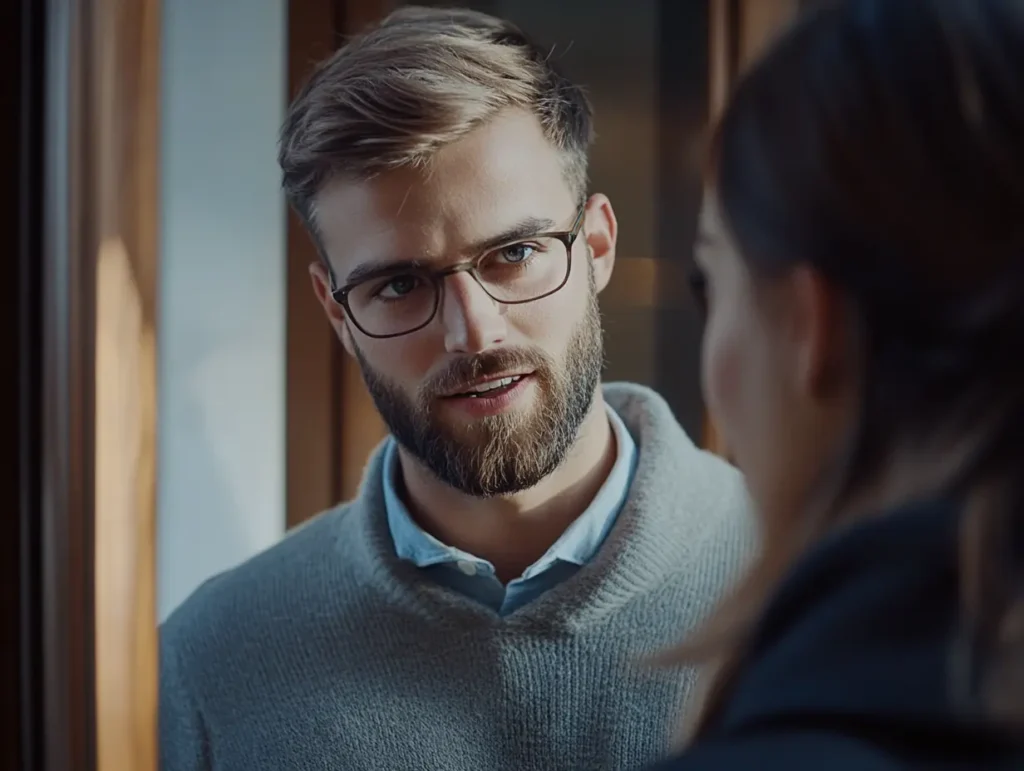
“It’s mine,” she said. He nodded, eyes tracing the artwork on her walls — her paintings, bright and defiant, nothing like the soft pieces she used to make. “I’ve been… keeping up with things. I wanted to reach out sooner, but, well—” He trailed off. She raised an eyebrow. “But what?”
His laugh was brittle. “Things haven’t exactly gone as planned. The firm let me go a few months back. They said I wasn’t performing — can you believe that?” He shook his head, almost amused. “And Liora… she left. Took some of my money too. Guess she wasn’t in it for the long haul.” Clara watched him quietly, her expression unreadable.

He went on, still smiling like he was trying to make the story sound less pathetic. “Anyway, I was just wondering — how did you manage all this? The treatments, the rent, everything?” She tilted her head slightly. “You mean how did I survive after you left me to die?” The smile froze on his lips. “That’s not fair—”
“It’s true,” she said calmly. “You stopped showing up. You stopped answering. I was barely breathing, Evan, and you couldn’t even pretend to care.” He faltered, eyes dropping to the floor. “My mom handled what she could,” she continued evenly.

“And then my grandfather’s inheritance came through. It was more than we expected — enough to cover everything. Enough for me to start over.” Evan’s face shifted — surprise first, then something greedier underneath. “That’s… incredible. For us.”
“For us?” she repeated softly. He blinked, realizing too late what he’d said. “I just meant— we’re still married, technically. I figured—” “You figured wrong,” she said, her tone cutting clean through the air.
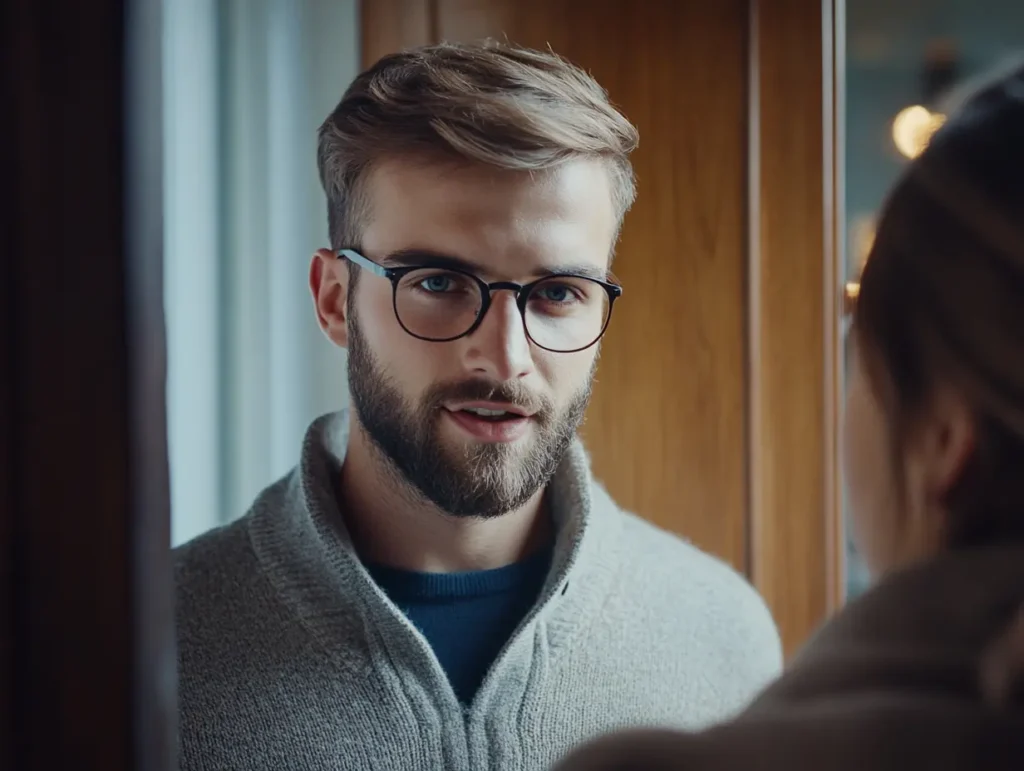
He hesitated, then took a slow step toward her, voice softening to a pleading murmur. “Clara, listen… I know I messed up. I was scared, I didn’t know how to handle it — seeing you sick, thinking I might lose you. But I’m here now. I can take care of you, of us. We can start over.”
She looked at him for a long moment — the same man who had walked out when she could barely stand, now standing in her doorway like a ghost of the life she’d already buried. “You want to take care of me now?” she asked quietly. “Where were you when I couldn’t even walk to the bathroom without help?

When the nurses had to hold me up because you were ‘stuck in traffic’?” He opened his mouth, but no words came. She walked to the kitchen counter, picked up a folded envelope, and handed it to him. He frowned. “What’s this?”
“Divorce papers,” she said. “You can sign them, or not. Either way, I’m done.” Evan’s lips parted like he wanted to protest, to reach for something familiar. But he didn’t. He just nodded, defeated, and turned toward the door.

At the threshold, he hesitated. “Clara… I never meant to hurt you.” She smiled faintly. “That’s the thing about meaning to, Evan. It doesn’t change the outcome.” When the door closed behind him, she stood there for a long time, letting the quiet settle.
The city moved outside her window, bright and alive. For the first time in years, she didn’t feel like she was surviving something — she was living again. She turned toward her easel, where a half-finished painting waited — a woman standing in sunlight, her back to the storm.
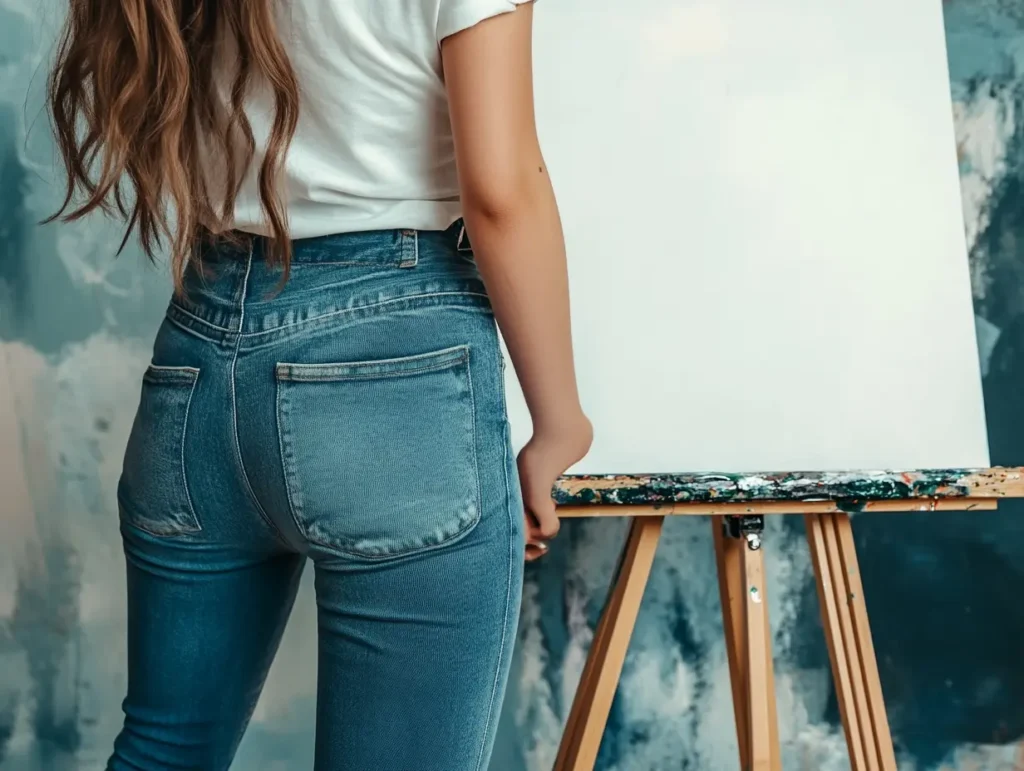
Clara picked up her brush, dipped it into gold, and began to paint again. The brush moved in steady, deliberate strokes, gold blooming across the canvas like sunlight breaking through clouds. Each motion felt lighter than the last, the weight of years lifting one layer at a time.
When she finally stepped back, the painting seemed to breathe — the woman radiant, unbowed, untouched by the storm behind her. Clara smiled softly. For the first time, she saw herself not as she was, but as she had become.

